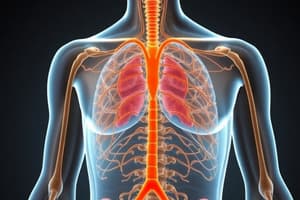Podcast
Questions and Answers
Which type of muscles cannot be controlled by voluntary movements?
Which type of muscles cannot be controlled by voluntary movements?
- Involuntary muscles (correct)
- Smooth muscles
- Skeletal muscles
- Cardiac muscles
What is the primary function of the circulatory system?
What is the primary function of the circulatory system?
- To filter waste from blood
- To provide oxygen to the body
- To transport blood and nutrients (correct)
- To control body temperature
Which system is responsible for removing waste materials in the form of urine?
Which system is responsible for removing waste materials in the form of urine?
- Endocrine system
- Excretory system (correct)
- Circulatory system
- Digestive system
Which organ produces insulin hormones in the endocrine system?
Which organ produces insulin hormones in the endocrine system?
What device is used to detect small electric currents?
What device is used to detect small electric currents?
Flashcards
Voluntary muscles
Voluntary muscles
Muscles that you can control their movement, like those used for walking, talking, and writing.
Circulatory system
Circulatory system
The system that transports blood, gases, nutrients, and hormones throughout the body.
Urination
Urination
The process of expelling urine from the body.
Insulin
Insulin
Signup and view all the flashcards
Resistors
Resistors
Signup and view all the flashcards
Study Notes
Revision Notes - The Genius in Science
- Involuntary Muscles: Muscles that move automatically; you cannot control their movement
- Voluntary Muscles: Muscles that can be controlled
- Endocrine System: Responsible for controlling body temperature and blood pressure
- Circulatory System: Transports blood, gases, nutrients, and hormones throughout the body
- Respiratory System: Provides the body with oxygen and removes carbon dioxide
- Digestive System: Converts complex food into simpler substances to produce energy
- Nephrons: Microscopic filters that remove harmful substances from the blood
- Urination: The process of expelling urine from the body
- Diabetes: A disorder of the endocrine system
- Insulin: A hormone that regulates the amount of sugar the body uses for energy
- Excretory System: Stores and removes waste materials produced by cells
- Urinary System: Removes waste materials from the blood in the form of urine, consisting of the kidneys, ureters, bladder, and urethra
- Kidney: Organ that cleans and filters the blood continuously
- Insulin Pump: Device that helps diabetics control blood sugar levels with automatic insulin injections
- Hormones: Help the body respond to different situations
- Pancreas: An organ of the endocrine system that produces insulin
- Electric Conductors: Materials that allow electric current or electrons to flow easily
- Electric Insulators: Materials that do not allow electric current or electrons to flow easily
- Electric Current: The flow of electric charges along a closed path
- Electric Circuit: The path for transmitting electric current
- Generator: Device that converts mechanical energy into electrical energy
- Galvanometer: Device for detecting small electrical currents
- Resistors: Components of an electric current
- Magnetic Materials: Materials that are attracted to a magnet
- Non-Magnetic Materials: Materials that are not attracted to a magnet
- Switch: A tool in an electric circuit used to open and close the circuit
- Series Circuit: Circuit where all components are connected in a single loop
- Parallel Circuit: Circuit where components are connected in two or more paths
- Gravity: The force of Earth that attracts all objects on its surface to its center
- Magnetic Field: The area around a magnet in which magnetic force appears
- Magnetism: The force that allows a magnet to attract some materials without making direct contact
- Heart: A muscle that regularly pushes blood through the body
- Artificial Pacemaker: Device that simulates heartbeats
- Atom: The smallest structural unit of matter
- Molecule: A group of atoms bonded together
- Temperature: A measure of the average kinetic energy of molecules and atoms
- Melting: The change of state from solid to liquid
- Evaporation/Vaporization: The change of state from liquid to gas
- Condensation: Change of state from gas to liquid
- Freezing: The change of state from liquid to solid
- Melting Point: The temperature at which a substance changes from solid to liquid
- Boiling Point: The temperature at which a substance changes from liquid to gas
- Solids: Substances with fixed shape and volume
- Liquids: Substances with fixed volume and variable shape
- Gases: Substances with variable shape and volume
- Excretion: The process of removing waste materials from the body
- Kidneys: Responsible for filtering waste materials from blood
- Ureters: Tubes that carry urine from the kidneys to the bladder
- Bladder: Stores urine
- Urethra: Tube that carries urine out of the body
- Blood Sugar Levels: The amount of sugar in the blood
- Pancreas Produces insulin
Other Information
- November Revision 6th Primary First Term
- Prepared by Dr. Dina Abdul Tawab
- 01128970995
Studying That Suits You
Use AI to generate personalized quizzes and flashcards to suit your learning preferences.




